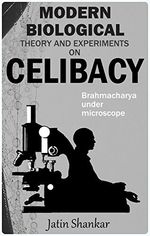
I've been reading "Modern Biological Theory and Experiments on Celibacy" by Jatin Shankar. The author is an agnostic from a Hindu background. Before anyone misunderstands my intentions, I am making this post to satisfy my own (and others) curiosity about any possible physical benefits that a man could receive from celibacy. I am not endorsing Hinduism nor am I suggesting that chastity is only worthwhile if a physical benefit can be realized through its practice. As Christian men, we are called to either marriage or celibacy through God's commandments. I will note that, although I read Mr. Shankar's book in its entirety, I did not closely examine every resource cited by his book.
Shankar believes that sexual activity has a negative influence on the lifespan of an organism. He attempts to support his hypothesis by looking at a number of studies to prove this. Shankar references a 1996 study titled "The Retardation of Aging by Caloric Restriction: Studies in Rodents and Primates" by Richard Weinruch. You may find this study here:
https://journals.sagepub.com/doi/epdf/10.1177/019262339602400618
According to the Weinruch study, rats that had their diets reduced (but not reduced to the point of starvation) lived longer than rats who didn't endure any shortages of food. Shankar leaps to the conclusion that, because the rats had a reduction in their food supply, they must have engaged in less sexual activity. Therefore, the reduction in sexual activity led to an increase in the rats' lifespans!
Unfortunately for Mr. Shankar, the Weinruch study was entirely based on female rats! No male rats were involved in the study, so the first study that he cites as supporting his hypothesis doesn't support it at all! Since I only skimmed the Weinruch study and was able to quickly ascertain that the study involved only female rats, I am left worrying about Mr. Shankar's integrity.
The second study cited by Mr. Shankar involves the castration of problematic male inmates at a mental asylum, "Effect of Castration in Adolescent and Young Adult Males Upon Further Changes in the Proportions of Bare and Hairy Scalp" by J.B. Hamilton. An abstraction of the article can be found here:
https://academic.oup.com/jcem/article-abstract/20/10/1309/2719329
Interesting, based on what I read in the article's abstract, castration of the inmates led to a significant reduction in male pattern baldness! I've copied the relevant section below:
"A study of 21 adolescent and young adult males, before castration and for eight to eighteen years afterwards, showed that after orchiectomy there was no development of male pattern baldness (MPB) nor of any grossly recognizable denudation of the scalp. There was no expansion of bald areas in existence at the time of castration. At the end of the study the eunuchs, compared with intact males of similar age, exhibited a significantly lower incidence of MPB (P = .01) and had no further loss of coarse hairs in the pattern that in most males results in recession of the frontal hairline."
WARNING: I am strongly opposed to male castration and don't want anyone to get any stupid ideas from this post.
Unfortunately for the inmates who already had bald patches, hair did not regrow in the bald spots (except for one man). But castrated inmates didn't lose their hair!
Mr. Shankar claims that this study proved that castrated inmates lived longer than their intact counterparts. I do not see any evidence of this claim in the abstract available online, but I cannot immediately disprove Shankar's reading of this study. Still, the study is interesting for the following reasons:
(1) It suggests that sexually active men are more likely to experience hair loss.
(2) Both the castrated and intact men experienced the same living conditions, thus removing the objection that different lifestyles may have contributed to the outcomes reported in each group by the study.
Shankar makes the bold claim that the castrated men in the experiment lived to age of 70 while the intact men only survived to 55 years or less. It's a bold claim, but why doesn't he quote the study directly so that the reader can verify it?
Shankar then turns to a Korean study on eunuchs for more evidence of his claim that male celibacy lengthens male lives. One can see an immediate problem with the Korean study, it only examines the lives of 81 eunuchs and such a small sample size raises questions about the veracity of the study's conclusions (summarized below):
"The average lifespan of eunuchs was 70.0 ± 1.76 years, which was 14.4–19.1 years longer than the lifespan of non-castrated men of similar socio-economic status. Our study supports the idea that male sex hormones decrease the lifespan of men."
The Korean study was mildly interesting and can be found here:
https://www.cell.com/current-biology/fulltext/S0960-98221200712-9#:~:text=The average lifespan of eunuchs,decrease the lifespan of men.
I was very disappointed with this small booklet. My hopes for finding any scientific evidence proving the existence of physical benefits for celibate men were crushed. Mr. Shankar had an interesting hypothesis but he failed to find any compelling evidence to back it up.

The following is a 2013 article on continence written by Sven Longshanks. I found it inspirational and wanted to share it.
EDIT: Yeah, I had my reservations and skepticism when purchasing the book (it was cheap, so don't worry). But what bothered me is that Shankar made bold claims, cited scientific studies as proof of those claims, and seemed to hope that no one would bother examining his cited sources.




